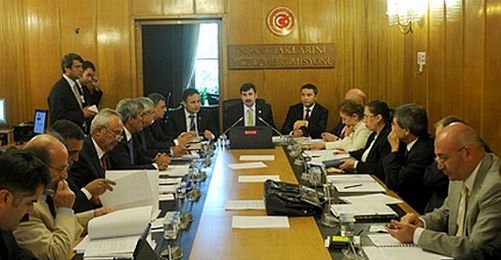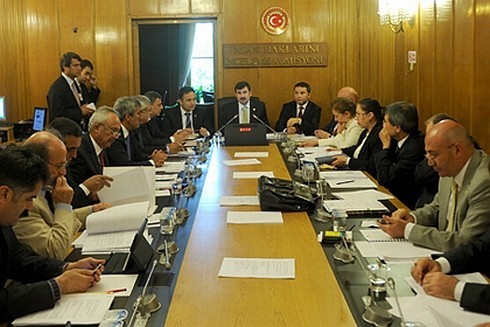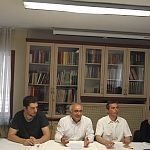HUMAN RIGHTS INSTITUTION
Deputy Kürkçü: “Another Bureaucratic Office Is In the Works”


Parliament's Human Rights Commission approved the Turkish Human Rights Institution Draft Law today and passed it onto the General Assembly.
Of the institution's 11 members, seven are to be selected by the Cabinet, and thus the agency represents a structure under the government's control, Ertuğrul Kürkçü, a BDP deputy from the southern province of Mersin, told bianet.
The entire concept of a "state that protects human rights" is tantamount to an oxymoron, he said, adding that the formation of this long-awaited institution, also regarded as part of the membership negotiation process with the European Union (EU,) has also ended up just like other processes pertaining to EU harmonization.
"[The Draft Law] renders it possible to tell the EU that we have established a national human rights institution, but in terms of its contents, a government office that is incapable of waging a struggle within the framework of human rights is in the works [here,]" he said.
"The source of the violations is the state, and the government monitors them"
The commission rejected the BDP's proposal regarding the composition of the institution's members and only accepted their request for changing the wording on the qualifications sought for membership from "being a Turkish citizen" to "being a citizen of the Turkish Republic," Kürkçü explained.
"This is not a matter over principles. We had proposed the complete withdrawal of this law, to review it in light of suggestions advanced by institutions with expertise in human rights, and for arranging [the institution's] structure in accordance with these suggestions. The CHP (People's Republican Party) had also made a similar proposal, but it was not accepted, and neither were the other proposals we made for altering [the draft law,]" he added.
The structure created by the draft law is incompatible with the Paris Principles that constitute the basis of all human rights institutions, and the commission placed it in a direct relationship of control with the state that represents the chief source of human rights violations as a whole and its legislative branch, the government, according to Kürkçü.
"Members ought to have been selected from the human rights community"
The clauses under the draft law's fifth article require no other qualification for membership in the institution beyond that which is required for the employment of civil servants, Kürkçü said.
"Paris Principles recommend that people who are to be affiliated with national institutions come from [human rights] institutions, government agencies that investigate human rights issues, journalists who advocate human rights [and] academics, or from the human rights community as a whole. It also stresses that [affiliates] who come from the government ought to be [selected] from among people who can form a link between these institutions and the government," he said.
The draft law brings no novelties in the qualities sought in members of the commission and the sub-commission, however, he added.
"And thus, there is nothing left now which prevents this institution from having 11 members who bear no direct relationship to the human rights community," said Kürkçü.
"The institution will not be able to step out of the government's control"
The draft law penned down by the sub-commission stipulated that the institution would declare the candidate members to the prime minister who would then proceed to present the list to the Cabinet which would make the [ultimate] selection. The commission did make certain changes in the selection process, but Kürkçü believes that these alterations were hardly sufficient or effectual to ensure the institution's independence from the government.
"Our proposal to select the members via a two-thirds majority in Parliament rather than [handing the process over] to the Cabinet got rejected. In turn, [the commission decided to allow] the office of the president to select two members, the Higher Education Board (YÖK) to select one member, the Union of Turkish Bar Associations to select one member and the Cabinet to select the remaining seven. That does not suffice to bring the institution out of the government's control. We do not think it possible that these members appointed in accordance with the government's criteria could play the role of a critic against the government," Kürkçü said.
Kürkçü also added that the institution would not be able to fulfill the functions stipulated in the relevant United Nations resolution, such as offering opposing views, critique and warnings over statements issued by the government and drawing the government's attention to human rights violations in an independent manner.
"A new bureaucratic office is born"
"The draft law to be handed over to Parliament has unfortunately led to nothing but fanfare. Another bureaucratic office is born. This bureaucratic office is going to overshadow all human rights institutions that work independently [since authorities can now] cite the presence of a novel national human rights institution," he said.
"Human rights policy to go in tandem with anti-terrorism policy"
At the beginning, the BDP had also considered the possibility of the institution acting as a "truth commission" in a milieu of warfare where the Kurdish people have been denied their rights, according to Kürkçü.
"We insisted on the Human Rights Institution being an autonomous [body] composed entirely of independent individuals, which receives its budget from public [sources,] for Parliament to select its members and for it [to retain] its independence from the government in [fulfilling] its tasks. Our proposals were denied, however," he said.
"Under these circumstances, it is apparent that the government will have institutionalized a human rights policy that goes in tandem with its 'anti-terrorism' policy. Since the government's 'anti-terrorism' policy is based on the denial of rights, we see that [they] have created this institution for the purpose of sheathing this policy under the cover of human rights," Kürkçü said.
The draft law is unacceptable even in its current form and shape, he added.
"The fierce reaction showed by certain members and the minister against opposition deputies who criticized particularly the inclusion of the president during today's debates has also yielded a clue as to how the government and the state could react to criticism raised by this institution. [And thus we understand,] they will prefer [candidates] who do not maintain a critical distance to the government," he said. (AS)
bianet submits shadow report to UN Human Rights Committee

Imprisoned lawyer exposes use of disciplinary investigations to pressure political prisoners

Tap water ‘smells of bleach’ in Muğla prison

Censorship on a letter from prison describing hunger

Prisoner on hunger strike: 'I am alone without sunlight'







